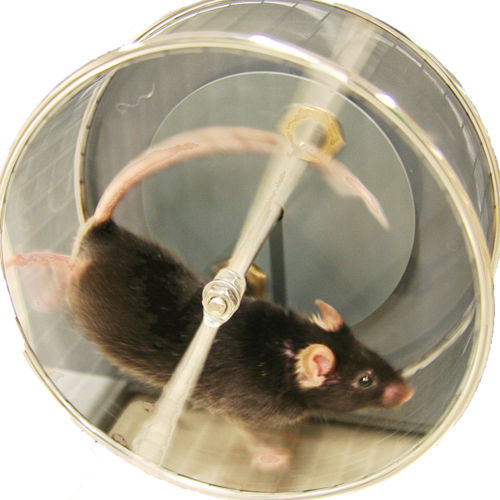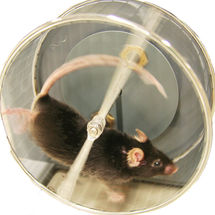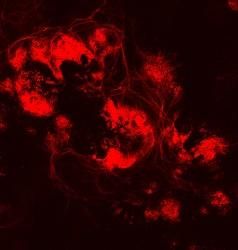Serotonin mediates exercise-induced generation of new neurons
Advertisement
Mice that exercise in running wheels exhibit increased neurogenesis in the brain. Crucial to this process is serotonin signaling. These are the findings of a study by Dr. Friederike Klempin, Daniel Beis and Dr. Natalia Alenina from the research group led by Professor Michael Bader at the Max Delbrück Center (MDC) Berlin-Buch. Surprisingly, mice lacking brain serotonin due to a genetic mutation exhibited normal baseline neurogenesis. However, in these serotonin-deficient mice, activity-induced proliferation was impaired, and wheel running did not induce increased generation of new neurons.

Wheel-running Mouse
Friederike Klempin and Daniel Beis/ Copyright: MDC

In wheel-running mice, the number of proliferating cells (red) that become neurons (green) in the hippocampus is increased, provided they have serotonin (left). In mice that due to a genetic mutation cannot produce serotonin, the number of proliferating cells is not increased following exercise (right).
Friederike Klempin/ Copyright: MDC


Scientists have known for some time that exercise induces neurogenesis in a specific brain region, the hippocampus. However, until this study, the underlying mechanism was not fully understood. The hippocampus plays an important role in learning and in memory and is one of the brain regions where new neurons are generated throughout life.
Serotonin facilitates precursor cell maturation
The researchers demonstrated that mice with the ability to produce serotonin are likely to release more of this hormone during exercise, which in turn increases cell proliferation of precursor cells in the hippocampus. Furthermore, serotonin seems to facilitate the transition of stem to progenitor cells that become neurons in the adult mouse brain.
For Dr. Klempin and Dr. Alenina it was surprising that normal baseline neurogenesis occurs in mice that, due to a genetic mutation, cannot produce serotonin in the brain. However, they noted that some of the stem cells in serotonin-deficient mice either die or fail to become neurons.
Yet, these animals seem to have a mechanism that allows compensation for the deficit, in that progenitor cells, an intermediate stage in the development from a stem cell to a neuron, divide more frequently. According to the researchers, this is to maintain the pool of these cells.
However, the group of wheel-running mice that do not produce serotonin did not exhibit an exercise-induced increase in neurogenesis. The compensatory mechanism failed following running. The researchers concluded: “Serotonin is not necessarily required for baseline generation of new neurons in the adult brain, but is essential for exercise-induced hippocampal neurogenesis.”
Hope for new approaches to treat depression and memory loss in the elderly
Deficiency in serotonin, popularly known as the “molecule of happiness”, has been considered in the context of theories linking major depression to declining neurogenesis in the adult brain. “Our findings could potentially help to develop new approaches to prevent and treat depression as well as age-related decline in learning and memory,” said Dr. Klempin and Dr. Alenina.




















































